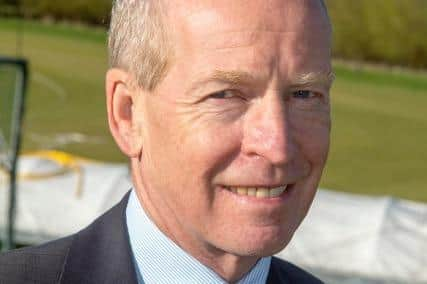Obituary: Willie Donald, former Scotland cricketer and President of Cricket Scotland
“Willie Donald is one of those seemingly laid-back six-footers who treat cricket as a walk on the mild side,” began a newspaper report in 1995 on one of the final appearances of the former international cricketer.
After playing for Scotland 58 times, including captaining his country at Lords, it was far from being his last involvement in the sport he dedicated a large part of his life to and one he cared for passionately. His playing days at the top level were matched by his work behind the scenes, becoming the first person ever to combine the roles of playing for Scotland (from 1978-86), serving as President of Cricket Scotland (2018-20) and acting as its interim chief executive for a spell (2015). Latterly, he also served as President of Aberdeenshire cricket club where he helped to negotiate the return of internationals to Mannofield as well as putting in place a strategy for the future development of the club.
Advertisement
Hide AdAdvertisement
Hide AdHe was a doer; relentlessly positive, never shirking responsibility and always open to taking on new challenges. Despite receiving treatment for cancer, he continued travelling from his home in Edinburgh to attend regular meetings at Aberdeen to put the cricket club on a sound footing. He only stood down a month before he died.


Willie Donald was born in Huntly and cricket was in his blood. His father was a fine player and it was not long before young Donald caught the eye. He soon progressed from playing for Huntly to Aberdeenshire which he represented for 12 years, four as captain.
He combined summer cricket with football in the winter, where as a gangly striker, he rattled in goals for Aberdeen University (going on to feature in both Scottish and British university teams) and later playing semi-professional in the Highland league for Peterhead, Fraserburgh and Huntly. In between all this, he took the first steps on what would be a successful business career, first with Citibank in Aberdeen before moving to London in 1983.
The notion that Donald treated any sport “on the mild side” did not match the reality. His calm demeanour masked a ferocious will to win that earned him the nickname “Stroppy Jock” when he played for Teddington, one of England’s top club sides during his years in London.
None of this might have happened had he been successful in securing his dream job. He wanted to be a fighter pilot but was rejected by the RAF for being too tall. He compensated in later years with a love of fast cars. One friend, recalling a particularly hair-raising journey with Donald at the wheel, said: “He never experienced life as a fighter pilot but drove as if he was one.”
The years in Teddington were very happy ones for Donald and his wife Esther, with the arrival of two children, Suzanne and Alasdair. The pull of Scotland remained strong and the family moved back in 1995 when he joined the Bank of Scotland.
As Head of e-Commerce at the bank, he set up Europe's first fully online mortgage business in the Netherlands at a time when online banking was only in its infancy. He also sat on the bank’s strategy board, overseeing the planning, development and implementation of business-wide organisational change. Latterly, he ran his own consultancy business delivering leadership and executive coaching programmes. This borrowed heavily from his sporting experiences, reflecting on the role of effective leaders in creating strong teams.
He was competitive in everything he did. Even in retirement when he took to walking the Scottish hills all it would take would be a group of walkers in the far distance and the cry would go up: “Let’s beat them to the top.” Invariably, the race was won.
Advertisement
Hide AdAdvertisement
Hide AdHe was deeply disappointed at a report this summer which found Cricket Scotland to be institutionally racist and spoke out against it. Although he accepted that much work remains to be done to improve diversity within cricket in Scotland, he criticised the report for its shallow approach in conducting a desktop analysis of diversity policies rather than a serious examination of alleged incidents of racism. He found it hard to understand how the report could come to conclusions regarding allegations made in 2015 without interviewing himself and others who dealt with these allegations at the time.
On the field, Scottish cricket has come a long way since Donald played in his country’s first Benson and Hedges match in 1980. He derived particular pleasure from Scotland’s triumph over a strong England team in a 50/50 friendly at the Grange in Edinburgh in 2018 when he spent some time watching proceedings in the company of the Rolling Stones’ drummer Charlie Watts.
Kenny Reid, captain of Aberdeenshire cricket club, paid tribute to his work at the club. “He was always so positive and got us all pulling in the same direction. He had some good ideas about the club and how to progress it, and hopefully we have started on that journey he put in place.”
Although always grateful for the care and treatment he received at the cancer centre at the Western General hospital in Edinburgh, he felt cheated that his life was going to be cut short. There was so much more he felt he could give and much more he wanted to do.
He is survived by his wife Esther, daughter Suzanne and son Alasdair and three grandchildren who provided much joy in the past few years, Aaron, Logan and Leo.
Obituaries
If you would like to submit an obituary (800-1000 words preferred, with jpeg image), or have a suggestion for a subject, contact [email protected]
Subscribe
Subscribe at www.scotsman.com/subscriptions
Comments
Want to join the conversation? Please or to comment on this article.